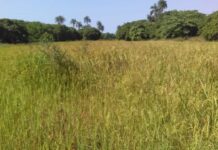Continuation
Welcome to another edition of Know Your Public Institutions Column which seeks to create awareness on the  nature and work of public institutions in the Gambia. This edition is continuation of an exclusive interview with Zainab Jallow, Director General Gambia Food Safety and Quality Authority FSQA on the establishment of FSQA.
nature and work of public institutions in the Gambia. This edition is continuation of an exclusive interview with Zainab Jallow, Director General Gambia Food Safety and Quality Authority FSQA on the establishment of FSQA.
Foroyaa: Can you please tell us about the mission of the Authority?
FSQA DG: The Authority’s primary mission is the overall official control of the safety and quality of food including water, beverages and animal feed, along the food chain from production up to its supply to the final consumer. The Authority is also responsible for the registration and licensing of food and feed establishments, approval of vehicles and vessels dealing with food, as well as the assessment and designation of laboratory services in terms of their technical capacities to carryout food and feed analysis/ testing for official control.
The FSQA is the sole National Competent Authority with powers of delegation mandated to officially control the safety and quality of food and animal feed whether locally produced, imported or destined for export. The work of the Authority is expected to contribute to consumer health and safety, the facilitation of trade and control of fraudulent and deceptive food marketing, labelling and advertising practices.
DG FSQA: The Food Safety and Quality Authority of The Gambia started operations in July 2013 following the assumption of duties of the Director General and the Deputy Director General of the Authority but only became functional in February 2014 with appointment of the first batch of food inspectors.
The Office of the Director General is responsible for the day-to-day administration of the Authority; drawing up a proposal for the Authority’s work programmes, implementing the work programmes and the decisions adopted by the Board of Directors. It is also responsible for ensuring the provision of appropriate scientific, technical and administrative support for the Scientific Committee and the Scientific Working Group; ensuring that the Authority carries out its tasks in accordance with the requirements of this Act; the preparation of the statement of revenue and expenditure and the execution of the budget of the Authority; ensuring that the Authority is adequately staffed for the performance of its functions; and developing and maintaining contact with all relevant stakeholders in the areas of food safety and quality.
Foroyaa: Can you tell our readers your directorates and their functions?
DG FSQA: The Food Control Directorate is responsible for preparation of risk profiles for different types of food businesses as a basis for risk management, preparation of annual inspection plans and reports, preparation and management of inspection guidelines and checklists, and management and implementation of official controls in food businesses under direct control of (the) Authority. The core of the Authority’s function is the official control of food safety, which includes inspection, sampling, and actions in case of non-compliance. The Directorate is concentrating on efforts not only to identify and register food business establishments, but also to undertake a baseline survey of all food business establishments for the purposes of categorization based on risk to consumers. This will allow the development of an inspection plan taking into consideration the number of intervention required per annum per category and enable maximum utilization of both human and financial resources. Under this Directorate the following activities were implemented during 2014:
Inspections have started of food establishments that have been deemed high risk by stakeholders during the development of the annual inspection plan of the Authority. These involve bakeries, water producing establishments, sandikas (groundnuts and groundnut products, ripened fruits) and municipal markets. A draft checklist has been developed to help the officers in carrying out their duties.
Major problems identified during these inspection visits have been the discovery of non-hygienic practices especially within bakeries (pit latrines in close proximity) and water processing plants (sachets) (pictures attached). Within the sandikas and markets, we have had to confiscate poultry products that were not in line with the guidelines developed for poultry and poultry products and fruits that have been artificially ripened using calcium carbide, which contains the traces of arsenic and phosphorus, which pose a serious threat to human health. Acetylene gas, a by-product of calcium carbide, creates heat. It is mainly used as a fuel and in welding, and contains toxic impurities that affect the nervous system. When acetylene is filled amidst the fruit in a box, it heats the fruit on the outside, and thus the mangoes and oranges turn yellow or orange, as the case may be.
Violation notices are given to repeat offenders whilst improvement notices have been given to food establishments that are not compliant with the FSQ Act 2011. Improvement notices allow for the establishments to make the changes recommended by the Authority. Where these changes require infrastructural work, the establishments are asked to close and refrain from production of any food products during this time.
Scientific Affairs Directorate
The Scientific Affairs Directorate is responsible for assessing demand for laboratory testing for official control. It is also responsible for maintaining lists of nominated competent laboratories and test methods (inside/outside Gambia), liaising with laboratories on testing methods/results and GLPs proficiency testing, accreditation bodies etc. The SAD supports development and provision of professional training in food safety, manages in-service training of technical staff, design risk-based guidelines for import controls (origin controls, documentary, integrity and physical checks, sampling regimes and test parameters and protocols). Currently there are two principal scientific officers responsible for risk profiling and laboratory assessment and a scientific officer.



















